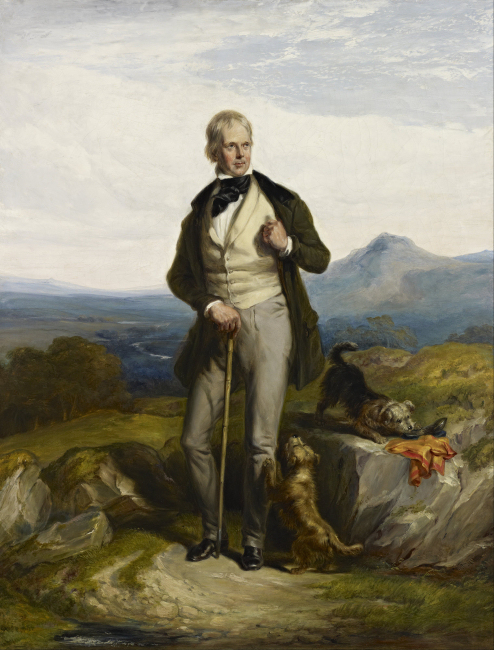
And so I come by Sir Walter Scott via H.P. Lovecraft. Perhaps this is not a common statement nowadays. But Barnes and Noble has put out a collection of stories called H.P. Lovecraft Selects, a compilation of Lovecraft's recommendations from his essay "Supernatural Horror in Literature". I'd always meant to go through all of Lovecraft's recommendations so this was pretty handy and I've been slowly making my way through the tales since October between all the other things I've been reading. This is how I first read Sir Walter Scott because an 1828 story of his, "The Tapestried Chamber", is included. Set just after the American Revolutionary War, it centres on a veteran of that war returning to England and staying at the home of an acquaintance near "a small country town, which presented a scene of uncommon beauty, and of a character peculiarly English." Scott, a Scotsman, is known for his works of fiction involving Scotland so I guess it's kind of funny my first exposure to him is a story clearly meant to evoke a particularly English nostalgia. The supernatural element, the fact that the room the protagonist stays in turns out to be haunted, isn't explicitly linked to how the incident is couched, but maybe there's something in being on the losing side of a war that was in many ways ideological that makes sense of a ghost who's frightening because of how little it seems to make sense on the surface.
Issues that come to the surface for reasons outside discernible, rational logic are of course a hallmark of H.P. Lovecraft's work so it makes sense he'd consider this story to be an influence. I was surprised how effective it was; it starts off pleasant enough with Scott's descriptions of his protagonist's journey. The tranquil, pastoral tone is very suddenly replaced by something bizarrely visceral in a description of the walking, seventeenth century corpse of an old woman that disturbs the soldier's sleep. This is followed by a discordantly mild denouement that leaves an eerie after-taste; a couple of friends affably discussing the matter that suggests the ways in which terrible issues are suppressed by the commonplace.
So this sure won me over on Walter Scott. I looked through the list of novels he wrote, probably I should've started with Ivanhoe or Waverley, but I've been reading his 1822 novel The Pirate. I'm only seven chapters in, just under a fourth of the way through. The first couple of chapters weren't especially interesting, introducing the environs and some of the history of Zetland in the seventeenth century--the place and time in which the novel's set--and the old man and his adult son who come to live there. The son, Mordaunt, is a barely sketched romantic figure who's described as befriending the two beautiful daughters of the local landlord. An entire chapter is spent describing the daughters but remains ploddingly abstract throughout, using no dialogue and few anecdotes to establish that one daughter is serious and the other fun and Mordaunt has no way of choosing between the two or any apparent desire to.
But then things start to get colour when Scott spends a series of chapters concentrating on a house Mordaunt's forced to take shelter in during a bad storm. We're given the entertaining backstory of its residents--an eccentric horticulturist who failed in an attempt to become a pastor and his miserable sister named Baby. And then another mysterious visitor arrives and Scott gives this wonderfully gothic description of the witch, Norna:
“I say to you beware—while Norna looks forth at the measureless waters, from the crest of Fitful-head, something is yet left that resembles power of defence. If the men of Thule have ceased to be champions, and to spread the banquet for the raven, the women have not forgotten the arts that lifted them of yore into queens and prophetesses.”
The woman who pronounced this singular tirade, was as striking in appearance as extravagantly lofty in her pretensions and in her language. She might well have represented on the stage, so far as features, voice, and stature, were concerned, the Bonduca or Boadicea of the Britons, or the sage Velleda, Aurinia, or any other fated Pythoness, who ever led to battle a tribe of the ancient Goths. Her features were high and well formed, and would have been handsome, but for the ravages of time and the effects of exposure to the severe weather of her country. Age, and perhaps sorrow, had quenched, in some degree, the fire of a dark-blue eye, whose hue almost approached to black, and had sprinkled snow on such parts of her tresses as had escaped from under her cap, and were dishevelled by the rigour of the storm.
After the airless exposition on the landlord's daughters, this was a welcome change. After this, even the kinds of descriptions of gloomy landscape and buildings I wasn't particularly enjoying suddenly seemed awesome and absorbing. I look forward to the rest of the book.

No comments:
Post a Comment